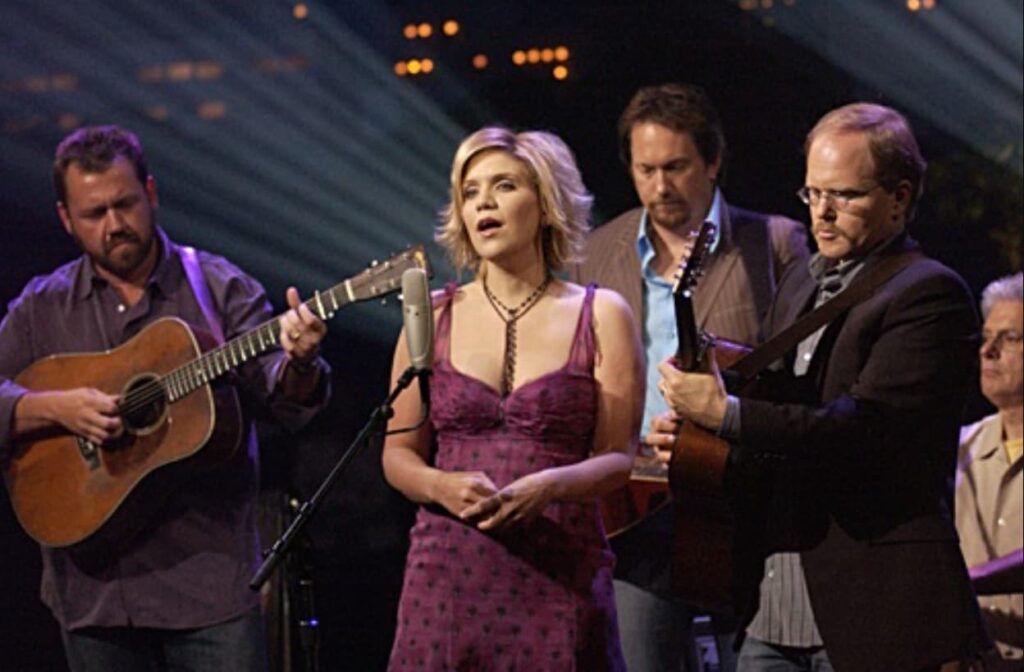
“Richmond On The James”: A Haunting Reflection on Love, Loss, and the Echoes of History
Ah, pull up a chair, won’t you? Let’s talk about a song that just gets under your skin and settles deep in your soul, much like a memory from long ago that you didn’t even know you held. We’re casting our minds back, not too far, but far enough for the dust of history to lend a poignant haze to the air, to a truly remarkable piece by Alison Krauss & Union Station: “Richmond On The James.” This isn’t just a song; it’s a whisper from the past, a lament, and a testament to enduring love and unimaginable loss.
This deeply evocative track, from their latest album, Arcadia, which was released on March 28, 2025, quickly made its mark. It soared to the very top, reaching Number 1 on the Bluegrass charts, a testament to the enduring power of Alison Krauss’s angelic voice and the masterful musicianship of Union Station. It also commanded attention on the Americana charts, peaking at Number 4, demonstrating its broad appeal beyond traditional bluegrass circles. Such chart success, especially after a fourteen-year hiatus from a studio album with Union Station, speaks volumes about the anticipation for new material from these titans of American roots music.
Now, the story behind “Richmond On The James” is as rich and somber as the song itself. It’s not a newly penned tale, but rather a profound reinterpretation of an existing narrative. The song is based on a poem, originally published in 1864, during the harrowing days of the American Civil War, credited to G.T. Burgess. While the original poem has long been in the public domain, Alison Krauss and her collaborators have breathed new life into it, transforming it into a musical masterpiece. There are whispers of earlier recordings, like one by Lena Bourne Fish in the 1950s, and even Anne Hills and Cindy Mangsen in the 1990s, suggesting the timeless resonance of this particular narrative. But it is Krauss and Union Station’s rendition that truly brings its heart-wrenching beauty to the fore for a contemporary audience.
The meaning woven into the fabric of “Richmond On The James” is one of profound sorrow and sacrifice. It paints a vivid, heartbreaking picture of a young soldier, wounded and dying on a blood-soaked field near Richmond, Virginia, beside the iconic James River. The lyrics speak of mourning, of wives and mothers weeping, and of youthful heroes tragically slain. We hear the soldier’s dying words to his comrade, asking him to carry messages and tokens of remembrance back to his family – his sword to his brother, the star from his breast to his dear sister, and a lock of brown hair to his mother, who still dreams of his safe return. It’s a testament to the innocence lost in the brutal crucible of war, highlighting the personal cost of conflict that often gets buried beneath grand narratives of strategy and victory. Alison Krauss herself has spoken of feeling a “calling” to be a messenger for these tragic stories of the past, seeing them as reflections of “the good old days when times were bad,” filled with bravery, valor, loyalty, and the eternal themes of human existence.
What truly elevates “Richmond On The James” is Alison Krauss’s ethereal vocal delivery, which lends an almost ghostly quality to the soldier’s final moments. Her voice, ever pure and imbued with a haunting fragility, carries the weight of history and the ache of human grief. The exquisite instrumentation by Union Station – Jerry Douglas’s dobro, Ron Block’s banjo, Barry Bales’s bass, and the subtle interplay of mandolin and guitar – creates a soundscape that is both mournful and breathtakingly beautiful. It’s a performance that doesn’t just tell a story; it makes you feel it, transporting you to that dusty, blood-stained field, allowing you to witness the poignant farewell. For older listeners, particularly those who grew up hearing tales of similar sacrifices, or perhaps even touched by the echoes of those conflicts, this song taps into a shared wellspring of historical memory and emotional depth. It reminds us that while years may pass and landscapes change, the universal themes of love, loss, and the enduring human spirit remain constant, etched into the very stones of time. It’s a masterclass in how traditional music can connect us to our collective past, making the distant resonate with the keenly felt present.